2022年中考英语二轮专题复习:专题15 构词法(51张ppt)
文档属性
| 名称 | 2022年中考英语二轮专题复习:专题15 构词法(51张ppt) |  | |
| 格式 | zip | ||
| 文件大小 | 1.5MB | ||
| 资源类型 | 教案 | ||
| 版本资源 | 人教新目标(Go for it)版 | ||
| 科目 | 英语 | ||
| 更新时间 | 2022-03-22 22:20:07 | ||
图片预览

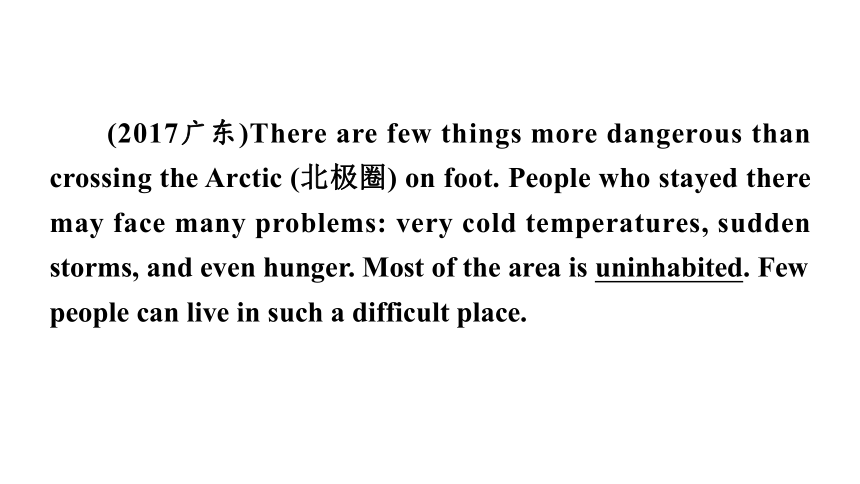
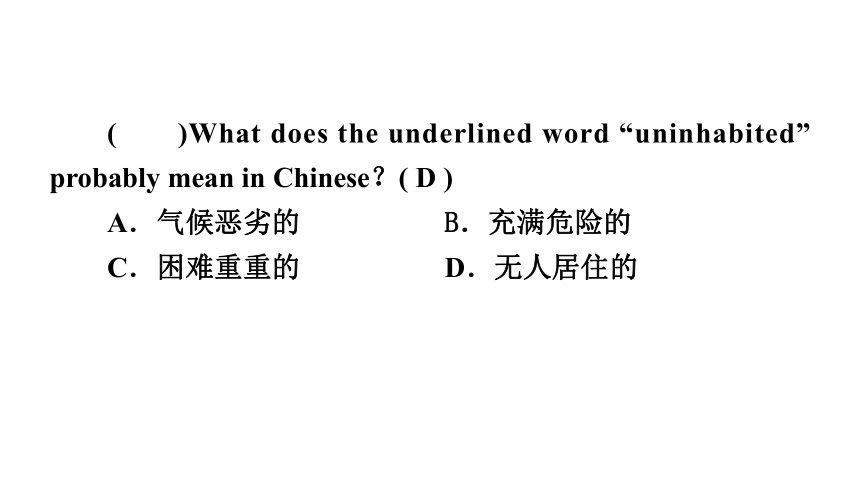
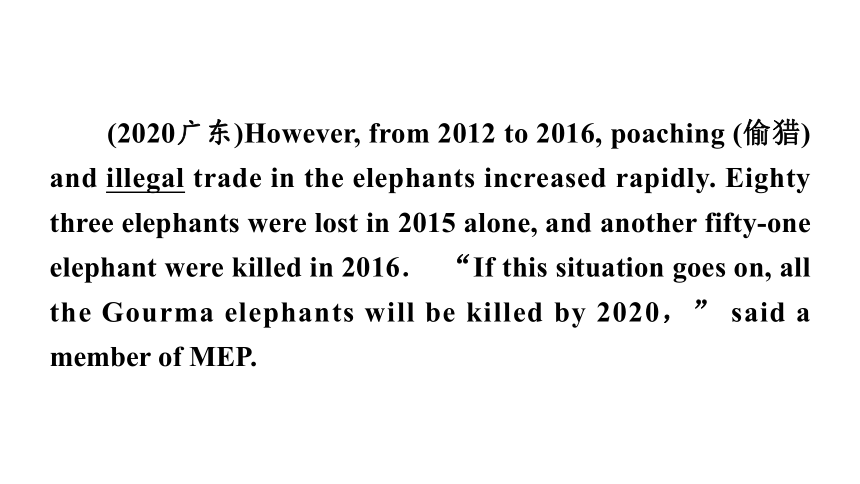
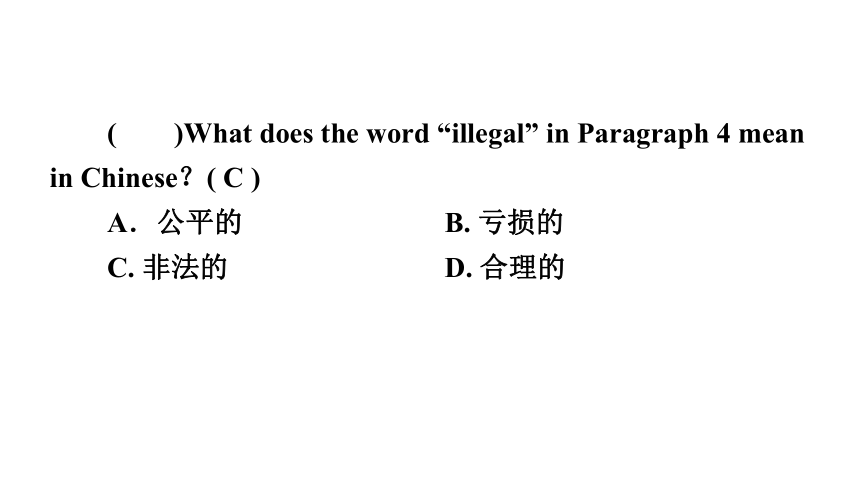
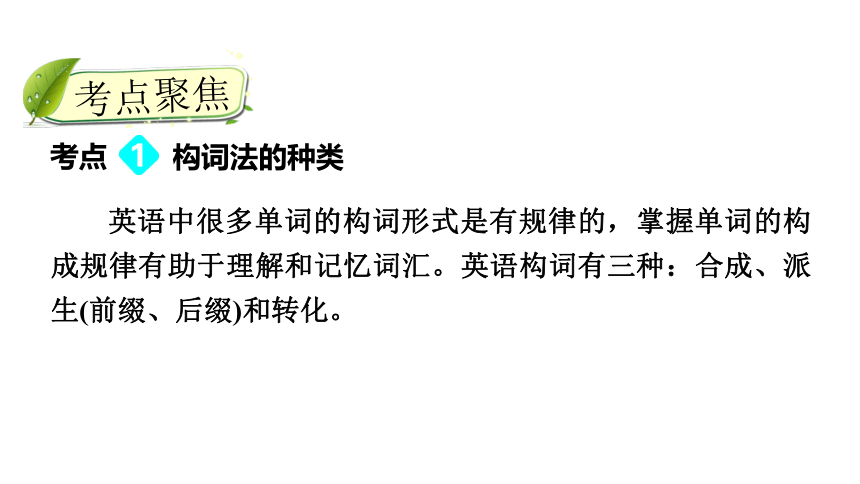
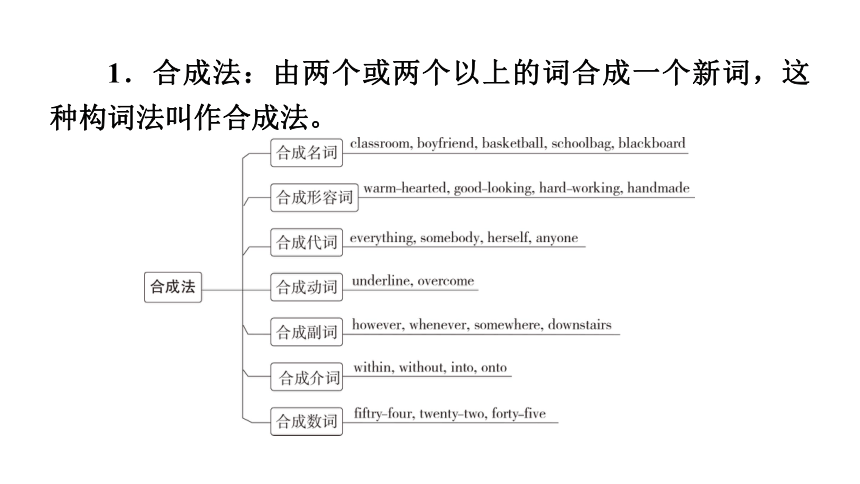

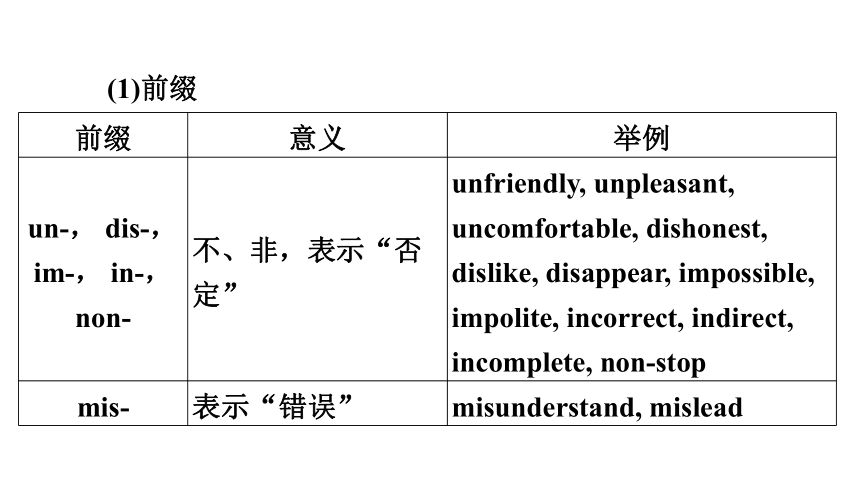
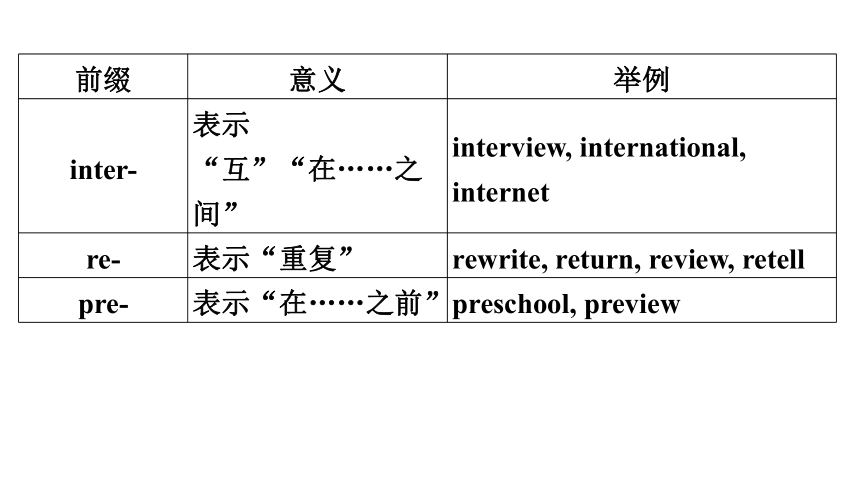
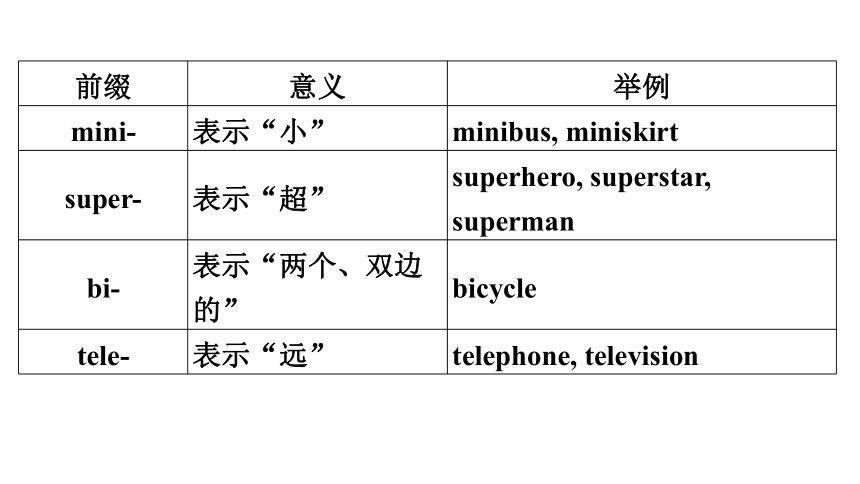
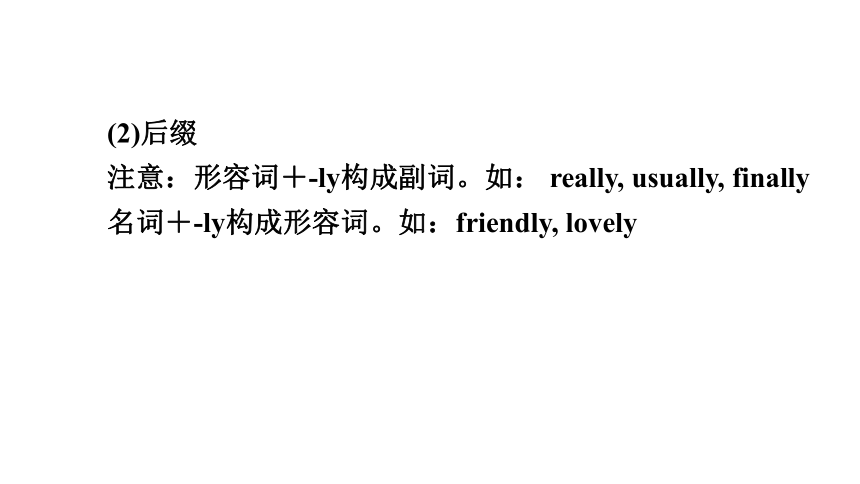
文档简介
(共51张PPT)
专题十五 构词法
(2017广东)There are few things more dangerous than crossing the Arctic (北极圈) on foot. People who stayed there may face many problems: very cold temperatures, sudden storms, and even hunger. Most of the area is uninhabited. Few people can live in such a difficult place.
( )What does the underlined word “uninhabited” probably mean in Chinese?( D )
A.气候恶劣的 B.充满危险的
C.困难重重的 D.无人居住的
(2020广东)However, from 2012 to 2016, poaching (偷猎) and illegal trade in the elephants increased rapidly. Eighty three elephants were lost in 2015 alone, and another fifty-one elephant were killed in 2016. “If this situation goes on, all the Gourma elephants will be killed by 2020,” said a member of MEP.
( )What does the word “illegal” in Paragraph 4 mean in Chinese?( C )
A.公平的 B. 亏损的
C. 非法的 D. 合理的
考点聚焦
英语中很多单词的构词形式是有规律的,掌握单词的构成规律有助于理解和记忆词汇。英语构词有三种:合成、派生(前缀、后缀)和转化。
考点
构词法的种类
1.合成法:由两个或两个以上的词合成一个新词,这种构词法叫作合成法。
2.派生法:在一个单词前面或后面加上一个词缀构成新词,这种构词法叫作派生法。加在单词前的词缀叫前缀,加在后面的词缀叫后缀。
(1)前缀
前缀 意义 举例
un-, dis-, im-, in-, non- 不、非,表示“否定” unfriendly, unpleasant, uncomfortable, dishonest, dislike, disappear, impossible, impolite, incorrect, indirect, incomplete, non-stop
mis- 表示“错误” misunderstand, mislead
前缀 意义 举例
inter- 表示“互”“在……之间” interview, international, internet
re- 表示“重复” rewrite, return, review, retell
pre- 表示“在……之前” preschool, preview
前缀 意义 举例
mini- 表示“小” minibus, miniskirt
super- 表示“超” superhero, superstar, superman
bi- 表示“两个、双边的” bicycle
tele- 表示“远” telephone, television
(2)后缀
注意:形容词+-ly构成副词。如: really, usually, finally
名词+-ly构成形容词。如:friendly, lovely
后缀 举例
构成名词 -or, -er, -ess, -ist actor, visitor, director; singer, runner, worker, teacher; goddess, actress; artist, scientist, tourist, pianist
-se Chinese, Japanese
-tion/-sion invitation, attraction, population, pronunciation; discussion
后缀 举例
构成名词 -ship friendship, relationship
-ment movement, development
-ness happiness, illness, kindness
构成形容词 -ful successful, beautiful, colourful, wonderful
-y funny, healthy, cloudy, windy, salty
-ing boring, exciting, interesting, outstanding
-ed surprised, balanced, relaxed, talented
后缀 举例
构成形容词 -al traditional, international, natural, personal, national
-able comfortable, unforgettable, suitable, changeable
-less homeless, hopeless, careless, helpless
-en wooden, golden
-ive active, collective, creative
-ish foolish, childish
构成副词 -ly really, usually, finally, truly
3.转化法是一个单词由一种词类转换为另一种词类。单词转化后的意义往往与之前的意义联系密切。
(1)名词转化为动词
show(n.) 展览,展示→show (v.) 表演,展出
hand(n.) 手→ hand (v.) 交给
water(n.) 水→water (v.) 浇水
colour(n.) 颜色→colour (v.) 给……着色
(2)形容词转化为动词
slow(adj.) 慢的→ slow(v.) 放慢
clean (adj.) 干净的→clean (v.) 把……弄干净
dry (adj.) 干的→ dry (v.) 使……变干
empty (adj.) 空的→empty (v.) 使……变空
(3)动词转化为名词
walk(v.) 步行→ walk (n.) 散步
look (v.) 看 →look (n.) 相貌
( )1.That man was __________ enough not to tell the manager that he would not do the job.
A.care B.careful
C.careless D.carelessness
备考演练
B
( )2.If you don’t have a deep love for something, don’t be __________ until you find one.
A.satisfy B.satisfied
C.satisfaction D.satisfying
( )3.The passage is about the __________ to this new kind of machine.
A.introduce B.introducing
C.introduction D.introductive
B
C
( )4.He is an expert at chemistry. We all call him a __________.
A.chemistry B.chemical
C.chemist D.physician
( )5.The Great Wall is more than 6,000 li in ______.
A.longer B.length
C.long D.longing
C
B
1.名词变形容词
考点
常见的词形变化
2.名词转化为形容词的不规则变化
energy→energetic (有活力的)
athlete→athletic (体育运动的)
hunger→hungry (饥饿的)
pride→proud (自豪的)
death→dead (死的)
science→scientific (科学的)
knowledge→knowledgeable (有知识的)
anger→angry (生气的)
Africa→African (非洲的)
America→American (美国的)
Brazil→Brazilian (巴西的)
Canada→Canadian (加拿大的)
Italy→Italian (意大利的)
Russia→Russian (俄罗斯的)
Swede→Sweden (瑞士的)
France→French (法国的)
China→Chinese (中国的)
England→English (英国的)
Japan→Japanese (日本的)
Britain→British (英国的)
3.动词变名词
teach→teacher (教师)
drive→driver (司机)
write→writer (作家)
dance→dancer (舞蹈家)
win→winner (获胜者)
run→runner (赛跑者)
visit→visitor (参观者)
invent→inventor (发明家)
translate→translator (翻译家)
educate→educator (教育家)
describe→description (描述)
predict→prediction (预言)
collect→collection (收藏)
decide→decision (决定)
build→building (建筑物)
mean→meaning (意思)
die→death (死亡)
fly→flight (飞行)
know→knowledge (知识)
please→pleasure (高兴)
pronounce→pronunciation (发音)
mix→mixture (混合物)
4.动词变形容词
please→pleasing (令人高兴)→pleased (感到高兴的)
surprise→surprising (令人惊讶的)→surprised (感到惊讶的)
excite→exciting(令人兴奋的)→excited (感到兴奋的)
interest→interesting (令人感兴趣的)→interested (感兴趣的)
worry→worrying (令人担忧的)→worried (感到担忧的)
(类似单词有:amaze, annoy, bore, disappoint, embarrass, frustrate, relax, terrify, thrill, tire等)
5.形容词的变化
(1)形容词变副词
quick→quickly (迅速地)
strong→strongly (强烈地)
heavy→heavily (重重地)
angry→angrily (生气地)
healthy→healthily (健康地)
noisy→noisily (吵闹地)
terrible→terribly (可怕地)
possible→possibly (可能地)
(2)形容词变名词
kind→kindness (善良)
happy→happiness (幸福)
warm→warmth (温暖)
safe→safety (安全)
confident→confidence (信心)
important→importance (重要性)
different→difference (差异)
true→truth (真理)
long→length (长度)
honest→honesty (诚实)
( )6.To my __________, I passed the exam easily.
A.joy B.joyful
C.joyless D.joys
( )7.Canada is mainly an __________ country.
A.English-speaking B.speak-English
C.spoken-English D.English-speak
备考演练
A
A
( )8.How __________ he is! He is always acting __________. He is really a __________.
A.foolish; foolishly; fool
B.fool; foolish; fool
C.foolish; fool; fool
D.foolishly; foolish; fool
A
( )9.The necklace that she lost is very expensive. It’s of great __________.
A.valuable B.value
C.valueless D.invaluable
( )10.There were ________ fish in the river in South America.
A.in danger B.danger
C.dangerous D.on dangerous
B
C
真题再现
他山之石
1.(2021辽宁)Now more and more people like the __________ (silent) in the countryside.
2.(2021辽宁)Dinner is ready.Please take your seats as __________ (quick) as possible.
silence
quickly
3.(2019山东临沂) Have you ever cut your finger on the edge (边缘) of a book page The small cut on your finger is so __________ (pain).
4.(2019江苏镇江)After the earthquake, plenty of food and clothes were provided for the ___________ (home) people.
5.(2019江苏常州)As a good teacher, she is never ____________ (patient) with her students.
painful
homeless
impatient
6. (2019江苏常州)Do you believe it is one of the ___________ (wind) places on the Earth
7.(2019江苏无锡)Look at you! You’re breathing so __________ (heavy). We’re not even halfway there yet.
8.(2019江苏徐州)We should behave ___________ (polite) in public.
windiest
heavily
politely
9. (2019上海)Online libraries are _________ (wide) used for learning in the information age.
10.(2019黑龙江龙东地区)The passenger felt much ___________ (hungry) than the others after the long journey.
widely
hungrier
模拟提升
A.短文填空基础练
1.It’s raining __________ outside.You’d better take a raincoat when you have to go out.
2.She likes dancing. She dreams to be a good ________.
heavily
dancer
3.Paper cutting is a ______________ Chinese skill with a history of thousands of years.
4.With the ______________ of science and technology, Beidou Guide System has come into our life and helped our life a lot.
5.Jim will hold his fifteenth birthday party next Sunday. Have you received his _____________ card
traditional
development
invitation
6.It is ___________ to cut in line before others while waiting for a bus.
7.Honesty is a virtue. Father warns me that ____________ people always find excuses for their mistakes.
8.Because of the heavy traffic jam, I missed the ____________ of the exciting film.
impolite
dishonest
beginning
9.The weather here is really _____________. People often experience seasons in a week.
10.Thanks to the modern technology, it’s ____________ to shop online.
changeable
convenient
B.语法选择专练
Sitting on the side of the highway and waiting to catch speeding (超速的) drivers, a police officer saw a car driving very slowly.
He thought to himself, “This driver is just as __1__ as a speeder!” So he turned on his lights __2__ and pulled the driver over (靠边停车).
Getting closer to the car, he noticed that there were five old ladies, two in the front seat and three in the back, wide-eyed and pale-faced.
The driver who knew __3__ about what happened said to him, “Officer, I don’t understand. I was doing exactly the speed limit! What seems to be the problem?” “Ma’am,” the __4__ replied, “you weren’t speeding, but you should know that driving slower than the speed limit is not good, because it can also be a bad __5__ to the drivers. The same as a speeder.”
“No, sir. I was doing the speed limit —__6__ twenty-two kilometers an hour!” The old woman said in a __7__ voice. The officer, almost __8__ to control his chuckle (窃笑), explained to her that “22” was the route number, not the speed limit. A bit embarrassed, the woman smiled widely and thanked the officer for pointing out her misunderstanding.
“But before I let you go, ma’am, I have to ask…. Is __9__ in this car OK These women seem to be shaking badly and they haven’t made a __10__ sound this whole time,” the officer asked.
“Oh, they’ll be all right in a minute. We just everyone got off Route 119.”
( )1.A.danger B.dangerous
C.more dangerous D.the most dangerous
( )2.A.quickly B.quick
C.quicker D.more quickly
( )3.A.something B.anything
C.nothing D.everything
( )4.A.office B.officer
C.official D.officers
B
A
C
B
( )5.A.dreamless B.dreamy
C.dreamer D.dream
( )6.A.exactly B.exact
C.more exactly D.most exactly
( )7.A.prouder B.proudly
C.proud D.proudest
( )8.A.able B.ability
C.enable D.unable
D
A
C
D
( )9.A.everyone B.anyone
C.nobody D.someone
( )10.A.singles B.singleness
C.single D.singly
A
C
专题十五 构词法
(2017广东)There are few things more dangerous than crossing the Arctic (北极圈) on foot. People who stayed there may face many problems: very cold temperatures, sudden storms, and even hunger. Most of the area is uninhabited. Few people can live in such a difficult place.
( )What does the underlined word “uninhabited” probably mean in Chinese?( D )
A.气候恶劣的 B.充满危险的
C.困难重重的 D.无人居住的
(2020广东)However, from 2012 to 2016, poaching (偷猎) and illegal trade in the elephants increased rapidly. Eighty three elephants were lost in 2015 alone, and another fifty-one elephant were killed in 2016. “If this situation goes on, all the Gourma elephants will be killed by 2020,” said a member of MEP.
( )What does the word “illegal” in Paragraph 4 mean in Chinese?( C )
A.公平的 B. 亏损的
C. 非法的 D. 合理的
考点聚焦
英语中很多单词的构词形式是有规律的,掌握单词的构成规律有助于理解和记忆词汇。英语构词有三种:合成、派生(前缀、后缀)和转化。
考点
构词法的种类
1.合成法:由两个或两个以上的词合成一个新词,这种构词法叫作合成法。
2.派生法:在一个单词前面或后面加上一个词缀构成新词,这种构词法叫作派生法。加在单词前的词缀叫前缀,加在后面的词缀叫后缀。
(1)前缀
前缀 意义 举例
un-, dis-, im-, in-, non- 不、非,表示“否定” unfriendly, unpleasant, uncomfortable, dishonest, dislike, disappear, impossible, impolite, incorrect, indirect, incomplete, non-stop
mis- 表示“错误” misunderstand, mislead
前缀 意义 举例
inter- 表示“互”“在……之间” interview, international, internet
re- 表示“重复” rewrite, return, review, retell
pre- 表示“在……之前” preschool, preview
前缀 意义 举例
mini- 表示“小” minibus, miniskirt
super- 表示“超” superhero, superstar, superman
bi- 表示“两个、双边的” bicycle
tele- 表示“远” telephone, television
(2)后缀
注意:形容词+-ly构成副词。如: really, usually, finally
名词+-ly构成形容词。如:friendly, lovely
后缀 举例
构成名词 -or, -er, -ess, -ist actor, visitor, director; singer, runner, worker, teacher; goddess, actress; artist, scientist, tourist, pianist
-se Chinese, Japanese
-tion/-sion invitation, attraction, population, pronunciation; discussion
后缀 举例
构成名词 -ship friendship, relationship
-ment movement, development
-ness happiness, illness, kindness
构成形容词 -ful successful, beautiful, colourful, wonderful
-y funny, healthy, cloudy, windy, salty
-ing boring, exciting, interesting, outstanding
-ed surprised, balanced, relaxed, talented
后缀 举例
构成形容词 -al traditional, international, natural, personal, national
-able comfortable, unforgettable, suitable, changeable
-less homeless, hopeless, careless, helpless
-en wooden, golden
-ive active, collective, creative
-ish foolish, childish
构成副词 -ly really, usually, finally, truly
3.转化法是一个单词由一种词类转换为另一种词类。单词转化后的意义往往与之前的意义联系密切。
(1)名词转化为动词
show(n.) 展览,展示→show (v.) 表演,展出
hand(n.) 手→ hand (v.) 交给
water(n.) 水→water (v.) 浇水
colour(n.) 颜色→colour (v.) 给……着色
(2)形容词转化为动词
slow(adj.) 慢的→ slow(v.) 放慢
clean (adj.) 干净的→clean (v.) 把……弄干净
dry (adj.) 干的→ dry (v.) 使……变干
empty (adj.) 空的→empty (v.) 使……变空
(3)动词转化为名词
walk(v.) 步行→ walk (n.) 散步
look (v.) 看 →look (n.) 相貌
( )1.That man was __________ enough not to tell the manager that he would not do the job.
A.care B.careful
C.careless D.carelessness
备考演练
B
( )2.If you don’t have a deep love for something, don’t be __________ until you find one.
A.satisfy B.satisfied
C.satisfaction D.satisfying
( )3.The passage is about the __________ to this new kind of machine.
A.introduce B.introducing
C.introduction D.introductive
B
C
( )4.He is an expert at chemistry. We all call him a __________.
A.chemistry B.chemical
C.chemist D.physician
( )5.The Great Wall is more than 6,000 li in ______.
A.longer B.length
C.long D.longing
C
B
1.名词变形容词
考点
常见的词形变化
2.名词转化为形容词的不规则变化
energy→energetic (有活力的)
athlete→athletic (体育运动的)
hunger→hungry (饥饿的)
pride→proud (自豪的)
death→dead (死的)
science→scientific (科学的)
knowledge→knowledgeable (有知识的)
anger→angry (生气的)
Africa→African (非洲的)
America→American (美国的)
Brazil→Brazilian (巴西的)
Canada→Canadian (加拿大的)
Italy→Italian (意大利的)
Russia→Russian (俄罗斯的)
Swede→Sweden (瑞士的)
France→French (法国的)
China→Chinese (中国的)
England→English (英国的)
Japan→Japanese (日本的)
Britain→British (英国的)
3.动词变名词
teach→teacher (教师)
drive→driver (司机)
write→writer (作家)
dance→dancer (舞蹈家)
win→winner (获胜者)
run→runner (赛跑者)
visit→visitor (参观者)
invent→inventor (发明家)
translate→translator (翻译家)
educate→educator (教育家)
describe→description (描述)
predict→prediction (预言)
collect→collection (收藏)
decide→decision (决定)
build→building (建筑物)
mean→meaning (意思)
die→death (死亡)
fly→flight (飞行)
know→knowledge (知识)
please→pleasure (高兴)
pronounce→pronunciation (发音)
mix→mixture (混合物)
4.动词变形容词
please→pleasing (令人高兴)→pleased (感到高兴的)
surprise→surprising (令人惊讶的)→surprised (感到惊讶的)
excite→exciting(令人兴奋的)→excited (感到兴奋的)
interest→interesting (令人感兴趣的)→interested (感兴趣的)
worry→worrying (令人担忧的)→worried (感到担忧的)
(类似单词有:amaze, annoy, bore, disappoint, embarrass, frustrate, relax, terrify, thrill, tire等)
5.形容词的变化
(1)形容词变副词
quick→quickly (迅速地)
strong→strongly (强烈地)
heavy→heavily (重重地)
angry→angrily (生气地)
healthy→healthily (健康地)
noisy→noisily (吵闹地)
terrible→terribly (可怕地)
possible→possibly (可能地)
(2)形容词变名词
kind→kindness (善良)
happy→happiness (幸福)
warm→warmth (温暖)
safe→safety (安全)
confident→confidence (信心)
important→importance (重要性)
different→difference (差异)
true→truth (真理)
long→length (长度)
honest→honesty (诚实)
( )6.To my __________, I passed the exam easily.
A.joy B.joyful
C.joyless D.joys
( )7.Canada is mainly an __________ country.
A.English-speaking B.speak-English
C.spoken-English D.English-speak
备考演练
A
A
( )8.How __________ he is! He is always acting __________. He is really a __________.
A.foolish; foolishly; fool
B.fool; foolish; fool
C.foolish; fool; fool
D.foolishly; foolish; fool
A
( )9.The necklace that she lost is very expensive. It’s of great __________.
A.valuable B.value
C.valueless D.invaluable
( )10.There were ________ fish in the river in South America.
A.in danger B.danger
C.dangerous D.on dangerous
B
C
真题再现
他山之石
1.(2021辽宁)Now more and more people like the __________ (silent) in the countryside.
2.(2021辽宁)Dinner is ready.Please take your seats as __________ (quick) as possible.
silence
quickly
3.(2019山东临沂) Have you ever cut your finger on the edge (边缘) of a book page The small cut on your finger is so __________ (pain).
4.(2019江苏镇江)After the earthquake, plenty of food and clothes were provided for the ___________ (home) people.
5.(2019江苏常州)As a good teacher, she is never ____________ (patient) with her students.
painful
homeless
impatient
6. (2019江苏常州)Do you believe it is one of the ___________ (wind) places on the Earth
7.(2019江苏无锡)Look at you! You’re breathing so __________ (heavy). We’re not even halfway there yet.
8.(2019江苏徐州)We should behave ___________ (polite) in public.
windiest
heavily
politely
9. (2019上海)Online libraries are _________ (wide) used for learning in the information age.
10.(2019黑龙江龙东地区)The passenger felt much ___________ (hungry) than the others after the long journey.
widely
hungrier
模拟提升
A.短文填空基础练
1.It’s raining __________ outside.You’d better take a raincoat when you have to go out.
2.She likes dancing. She dreams to be a good ________.
heavily
dancer
3.Paper cutting is a ______________ Chinese skill with a history of thousands of years.
4.With the ______________ of science and technology, Beidou Guide System has come into our life and helped our life a lot.
5.Jim will hold his fifteenth birthday party next Sunday. Have you received his _____________ card
traditional
development
invitation
6.It is ___________ to cut in line before others while waiting for a bus.
7.Honesty is a virtue. Father warns me that ____________ people always find excuses for their mistakes.
8.Because of the heavy traffic jam, I missed the ____________ of the exciting film.
impolite
dishonest
beginning
9.The weather here is really _____________. People often experience seasons in a week.
10.Thanks to the modern technology, it’s ____________ to shop online.
changeable
convenient
B.语法选择专练
Sitting on the side of the highway and waiting to catch speeding (超速的) drivers, a police officer saw a car driving very slowly.
He thought to himself, “This driver is just as __1__ as a speeder!” So he turned on his lights __2__ and pulled the driver over (靠边停车).
Getting closer to the car, he noticed that there were five old ladies, two in the front seat and three in the back, wide-eyed and pale-faced.
The driver who knew __3__ about what happened said to him, “Officer, I don’t understand. I was doing exactly the speed limit! What seems to be the problem?” “Ma’am,” the __4__ replied, “you weren’t speeding, but you should know that driving slower than the speed limit is not good, because it can also be a bad __5__ to the drivers. The same as a speeder.”
“No, sir. I was doing the speed limit —__6__ twenty-two kilometers an hour!” The old woman said in a __7__ voice. The officer, almost __8__ to control his chuckle (窃笑), explained to her that “22” was the route number, not the speed limit. A bit embarrassed, the woman smiled widely and thanked the officer for pointing out her misunderstanding.
“But before I let you go, ma’am, I have to ask…. Is __9__ in this car OK These women seem to be shaking badly and they haven’t made a __10__ sound this whole time,” the officer asked.
“Oh, they’ll be all right in a minute. We just everyone got off Route 119.”
( )1.A.danger B.dangerous
C.more dangerous D.the most dangerous
( )2.A.quickly B.quick
C.quicker D.more quickly
( )3.A.something B.anything
C.nothing D.everything
( )4.A.office B.officer
C.official D.officers
B
A
C
B
( )5.A.dreamless B.dreamy
C.dreamer D.dream
( )6.A.exactly B.exact
C.more exactly D.most exactly
( )7.A.prouder B.proudly
C.proud D.proudest
( )8.A.able B.ability
C.enable D.unable
D
A
C
D
( )9.A.everyone B.anyone
C.nobody D.someone
( )10.A.singles B.singleness
C.single D.singly
A
C
同课章节目录
- 词法
- 名词
- 动词和动词短语
- 动词语态
- 动词时态
- 助动词和情态动词
- 非谓语动词
- 冠词
- 代词
- 数词和量词
- 形容词副词及其比较等级
- 介词和介词短语
- 连词和感叹词
- 构词法
- 相似、相近词比较
- 句法
- 陈述句
- 一般疑问句和否定疑问句
- 特殊疑问句及选择疑问句
- 反意疑问句
- 存在句(There be句型)
- 宾语从句
- 定语从句
- 状语从句
- 主谓一致问题
- 简单句
- 并列句
- 复合句
- 主谓一致
- 主、表语从句
- 名词性从句
- 直接引语和间接引语
- 虚拟语气
- 感叹句
- 强调句
- 倒装句
- 祈使句
- 句子的成分
- 句子的分类
- 题型专区
- 单项选择部分
- 易错题
- 完形填空
- 阅读理解
- 词汇练习
- 听说训练
- 句型转换
- 补全对话
- 短文改错
- 翻译
- 书面表达
- 任务型阅读
- 语法填空
- 其他资料
